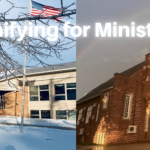Welcome to worship today at Morrison Zion Lutheran Church. We exist to glorify God. We have set out to do this by gathering around the Gospel so that we may grow in the Gospel and go to others with this Gospel.
Introduction:
As we begin with our Introduction and our Confession and Absolution, we’ll look at words from Isaiah. We’ll hear some songs using words from Isaiah to begin our service. It’s that reminder that God’s Word, the Gospel message of salvation, is not just in the New Testament but it has been promised from long ago, way back in those beautiful words where the prophet Isaiah shares so much Gospel with us. So we begin with some words of Isaiah.
(Congregation sings This is the Day the Lord Has Made. Follow the Bulletin at this point until Section I.)
The first section of our concert focuses on how we rejoice that we have a Savior. Here we will hear some words of Isaiah that are spoken but in the context of Philip going to share with the Ethiopian, this Ethiopian eunuch who was reading the Gospel but he didn’t know what it meant. He didn’t know about his Savior and the fact that we have this Savior and that we can connect with what that means for us; that we’re forgiven. We are going to see that the Ethiopian is then baptized. He knows of his salvation. When we get to know our Savior, we’ll see what that means. We are going to rejoice in that. We are going to see that we are forgiven and that has been promised from long ago. We read from Acts 8:26-34 and see the blessings that we have because we know that we have a Savior.
Section I. We Rejoice That We Have a Savior
Reading Acts 8:26-34
Now an angel of the Lord said to Philip, “Go south to the road—the desert road—that goes down from Jerusalem to Gaza.” So he started out, and on his way he met an Ethiopian eunuch, an important official in charge of all the treasury of the Kandake (which means “queen of the Ethiopians”). This man had gone to Jerusalem to worship, and on his way home was sitting in his chariot reading the Book of Isaiah the prophet. The Spirit told Philip, “Go to that chariot and stay near it.”
Then Philip ran up to the chariot and heard the man reading Isaiah the prophet. Do you understand what you are reading?” Philip asked.
“How can I,” he said, “unless someone explains it to me?” So he invited Philip to come up and sit with him.
This is the passage of Scripture the eunuch was reading:
“He was led like a sheep to the slaughter,
and as a lamb before its shearer is silent,
so he did not open his mouth.
In his humiliation he was deprived of justice.
Who can speak of his descendants?
For his life was taken from the earth.”
The eunuch asked Philip, “Tell me, please, who is the prophet talking about, himself or someone else?”
(Continue in Bulletin until Section II.)
The second section of our concert today focuses on how we rejoice that we have the Word of God. We know many descriptions of what the Word of God means for us and what it is. Paul especially writes in Timothy that the Word of God is able to make us wise for salvation, that it’s useful for teaching, rebuking, correcting and training in righteousness. But as we look at what the Word of God is for us, as we look at some Scriptures from Isaiah and we are surrounded by two songs focusing on God’s Word from Isaiah, this picture of Isaiah and as he is called, as God’s Word comes to him, I think this shows us what God’s Word does for each of us.
Before we hear God’s Word, before we hear of the forgiveness, we cry out and we say “Woe! Woe to me!” when we don’t know of God’s forgiveness and what God’s Word is all about. But as God’s Word comes to us and fills us with forgiveness, what do we do? We can rejoice and then as God calls us to go out and share that Word and to go out and go to others, we can say “Here I am, send me,” because we have God’s Word. We have what we need. And we are filled with what we can do to go out and share that Word with others. So we rejoice we have the Word of God that shows us our Savoir, shows us that our sins are forgiven, and we rejoice that we can go out and share that message with others.
Section II. We Rejoice That We Have the Word of God
Reading Isaiah 6:1-8
In the year that King Uzziah died, I saw the Lord, high and exalted, seated on a throne; and the train of his robe filled the temple. Above him were seraphim, each with six wings: With two wings they covered their faces, with two they covered their feet, and with two they were flying. And they were calling to one another:
“Holy, holy, holy is the Lord Almighty;
the whole earth is full of his glory.”
At the sound of their voices the doorposts and thresholds shook and the temple was filled with smoke.
“Woe to me!” I cried. “I am ruined! For I am a man of unclean lips, and I live among a people of unclean lips, and my eyes have seen the King, the Lord Almighty.”
Then one of the seraphim flew to me with a live coal in his hand, which he had taken with tongs from the altar. With it he touched my mouth and said, “See, this has touched your lips; your guilt is taken away and your sin atoned for.”
Then I heard the voice of the Lord saying, “Whom shall I send? And who will go for us?”
And I said, “Here am I. Send me!”
(Continue in Bulletin until Section III.)
Our third section looks at how we rejoice that God cares for you. Right in the middle of our concert, we focus on Philippians 4, rejoice in the Lord always. If you see the little graphic on Page 4 in your Service Folder (and here), that’s the graphic you see on our church announcements, often at school. It’s been the theme for Morrison Zion for this fiscal year, for the school year—Rejoice in the Lord. What is interesting about rejoicing in the Lord in Philippians 4 is that Paul wasn’t in the greatest situation. He was in prison. But in that whole book he is writing over and over again about how we can rejoice. 
In this section, he explains how when we are in difficulties, when we are in trouble, that we can cast all our cares, all of our prayers, to God because He knows us. He is going to give us true peace. He is going to give us a peace that surpasses all understanding because He is not saying that life is going to be easy. Paul’s life was not easy. He’s telling us our life is going to be filled with hardship and that we live in a sinful world. But we see that God will never leave us and that He will give us the peace that we need. Most of all, that reconciliation with God, but then the peace to understand that He is working all things for our good, that He loves us and that we are His children. So we can rejoice that our God cares for us, focusing on the peace that He gives us which surpasses all of our understanding and knowing that the God of peace will be with us.
Section III. We Rejoice That God Cares for Us
Reading Philippians 4:4-9
Rejoice in the Lord always. I will say it again: Rejoice! Let your gentleness be evident to all. The Lord is near. Do not be anxious about anything, but in every situation, by prayer and petition, with thanksgiving, present your requests to God. And the peace of God, which transcends all understanding, will guard your hearts and your minds in Christ Jesus.
Finally, brothers and sisters, whatever is true, whatever is noble, whatever is right, whatever is pure, whatever is lovely, whatever is admirable—if anything is excellent or praiseworthy—think about such things. Whatever you have learned or received or heard from me, or seen in me—put it into practice. And the God of peace will be with you.
(Continue in Bulletin until Section V.)
Our next section is we rejoice in His love, even in death. If you look at the last two sections, how Jesus cares for us and how God wraps His arms around us, they really all flow into this—that even in death, we know that God cares for us and that we can rejoice in Him. These words are some of the basis for the next song we sing. As we talk about how we can rejoice in His love for us, even in death, I think we can think of that in two ways.
- For you, when you face death, we read the words of the Psalm that He forgives all our sins. He heals all our diseases and redeems your life from the pit. He will redeem your life. So even in death, the Lord loves you. From everlasting to everlasting, the Lord’s love is with those who fear Him. We know that our God is with us forever.
- But then for God to hold you in His arms when your loved ones pass as well and to know where they are when they die in the Lord. Our God is holding us and them and we can rejoice that our sins are forgiven and that there will be a reunion in heaven.
Your Lord cares for you. He holds you in His hands. Why can we have this rejoicing in all things? Because we know the greatest fear that many have in this world of death, the thing that none of us could overcome on our own, God has defeated. Our sins are forgiven and we have the promise that we will be with Him forever, from everlasting to everlasting.
Section V. We Rejoice in His Love, Even in Death
Reading Psalm 103 (Select Verses)
1 Praise the Lord, my soul;
all my inmost being, praise his holy name.
2 Praise the Lord, my soul,
and forget not all his benefits—
3 who forgives all your sins
and heals all your diseases,
4 who redeems your life from the pit
and crowns you with love and compassion,
8 The Lord is compassionate and gracious,
slow to anger, abounding in love.
12 as far as the east is from the west,
so far has he removed our transgressions from us.
15 The life of mortals is like grass,
they flourish like a flower of the field;
16 the wind blows over it and it is gone,
and its place remembers it no more.
17 But from everlasting to everlasting
the Lord’s love is with those who fear him,
and his righteousness with their children’s children— (NIV)
(Continue in Bulletin until Section VI.)
We also rejoice in who Jesus is. As the disciples were following Jesus, they were going through some difficult times at this time. In the chapter before, we see Jesus asked them who they thought He was. They gave different confessions. Peter said He was not Elijah, not John the Baptist, but He is the Son of God, the Messiah. But shortly after this, Jesus tells them what it means to be the Son of Man—that He would go to the cross, He would be arrested, He would be put on trial, and He would die. So Peter rebukes Him and says “No way! That’s not what we want! We want someone who is going to elevate us and help make our lives better.” So Jesus says “Get behind me Satan!” Then He goes on to tell them what it meant to be a follower of Christ—that we would take up our cross and follow Him; that we would need to deny ourselves.
So after going through these things, we see Jesus take Peter, James and John; Peter, who is probably still reeling from all these things and being called “Satan” because of these words that had in mind the things of man and not of God. They go up to the Mount of Transfiguration and here, Jesus is transfigured in glory. They see Moses and Elijah, those representing the Old Testament prophets and how the Word of God had promised that this Savior would come. We hear in Luke that they discuss what Jesus was about to do. The disciples had seen Jesus as a man walking around. They had seen miracles. But here they see Him glorified. Even though they know that He is going to go to the cross, He is going to go down from the Mount and go to Golgotha. Here they show a glimpse of who Christ is.
We need that glimpse as well, don’t we? We need to see who Christ is—that He went to the cross for us and He died for us, but He also was raised. He has defeated sin, death and the devil. We need to see the true Jesus—that it’s not all about life here and that sometimes life is hard, but most of all we have a Savior who has come to pay for our sins; to defeat sin, death and the devil; and to rise again. This is who the true Savior is. We can rejoice that we have this Savior who has come, shown His glory on the Mount, but then shows His glory as He goes down to the cross to die for your sins.
Section VI. We Rejoice in Who Jesus Is
Reading Mark 9:2-9
After six days Jesus took Peter, James and John with him and led them up a high mountain, where they were all alone. There he was transfigured before them. His clothes became dazzling white, whiter than anyone in the world could bleach them. And there appeared before them Elijah and Moses, who were talking with Jesus.
Peter said to Jesus, “Rabbi, it is good for us to be here. Let us put up three shelters—one for you, one for Moses and one for Elijah.” (He did not know what to say, they were so frightened.)
Then a cloud appeared and covered them, and a voice came from the cloud: “This is my Son, whom I love. Listen to him!”
Suddenly, when they looked around, they no longer saw anyone with them except Jesus.
As they were coming down the mountain, Jesus gave them orders not to tell anyone what they had seen until the Son of Man had risen from the dead.
(Continue in Bulletin until Section VII.)
As we close our concert, we rejoice in God’s peace. I would contend that what most of the people in the world are looking for is peace. We know that there is a lot of war in the world right now. There is division between many people in our world. You can speak about peace in that way, but the peace we talk about with God is even greater than the peace that the world talks about that is just temporary.
The greatest thing about the peace that comes from God is reconciliation with God. We’ve been at war with God because of our sins. We are born in sin. But God says that, through Christ, we are reconciled to God. Our sins are washed away. Our sins are forgiven. So we are now, again, at one with God. That means that throughout this life, we can know that our sins are forgiven and that we’ll be with Him once again in heaven, in true peace and unity.
The great words that we end with though speak about this God of peace and that we’ll be blameless when the Lord comes, but notice who is the one who does this. The peace that comes from being a Christian is that it’s not about us and how good we are. It says “The one who calls you is faithful, and he will do it.” The great peace we have as Christians is that we know our salvation comes from Christ alone. So we rejoice in that peace, knowing God is our great Savior and that the work is done and we rest alone, in His arms, knowing He has saved us.
Section VII. We Rejoice in God’s Peace
Reading 1 Thessalonians 5:22-24
May God himself, the God of peace, sanctify you through and through. May your whole spirit, soul and body be kept blameless at the coming of our Lord Jesus Christ. The one who calls you is faithful, and he will do it.
(Continue in Bulletin until the end.)
And the peace of God, which transcends all understanding, will guard your hearts and your minds in Christ Jesus. (Philippians 4:7) Amen.




